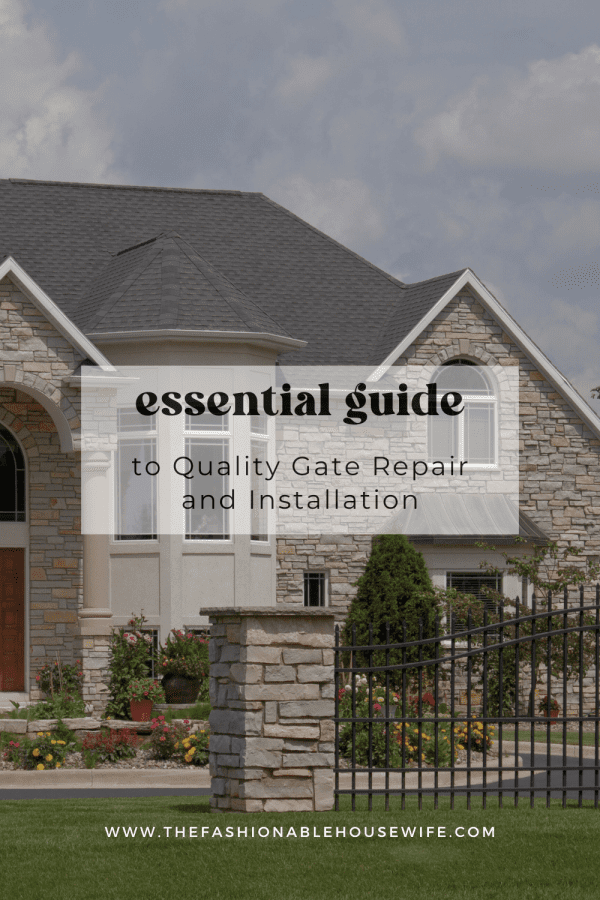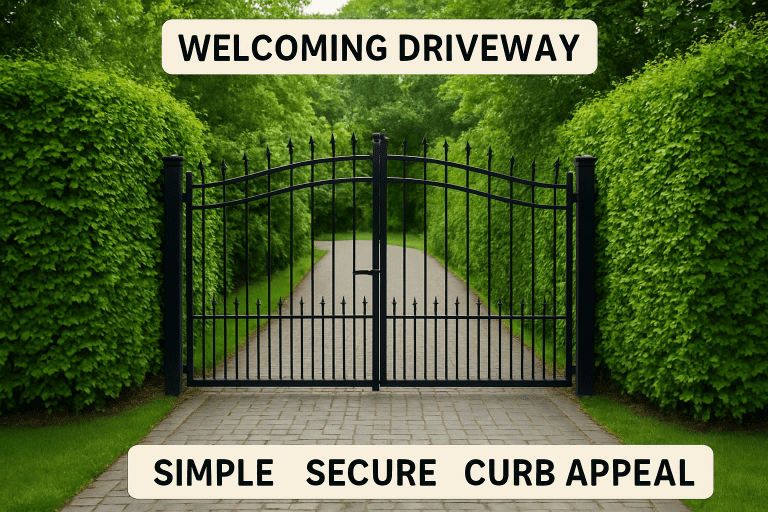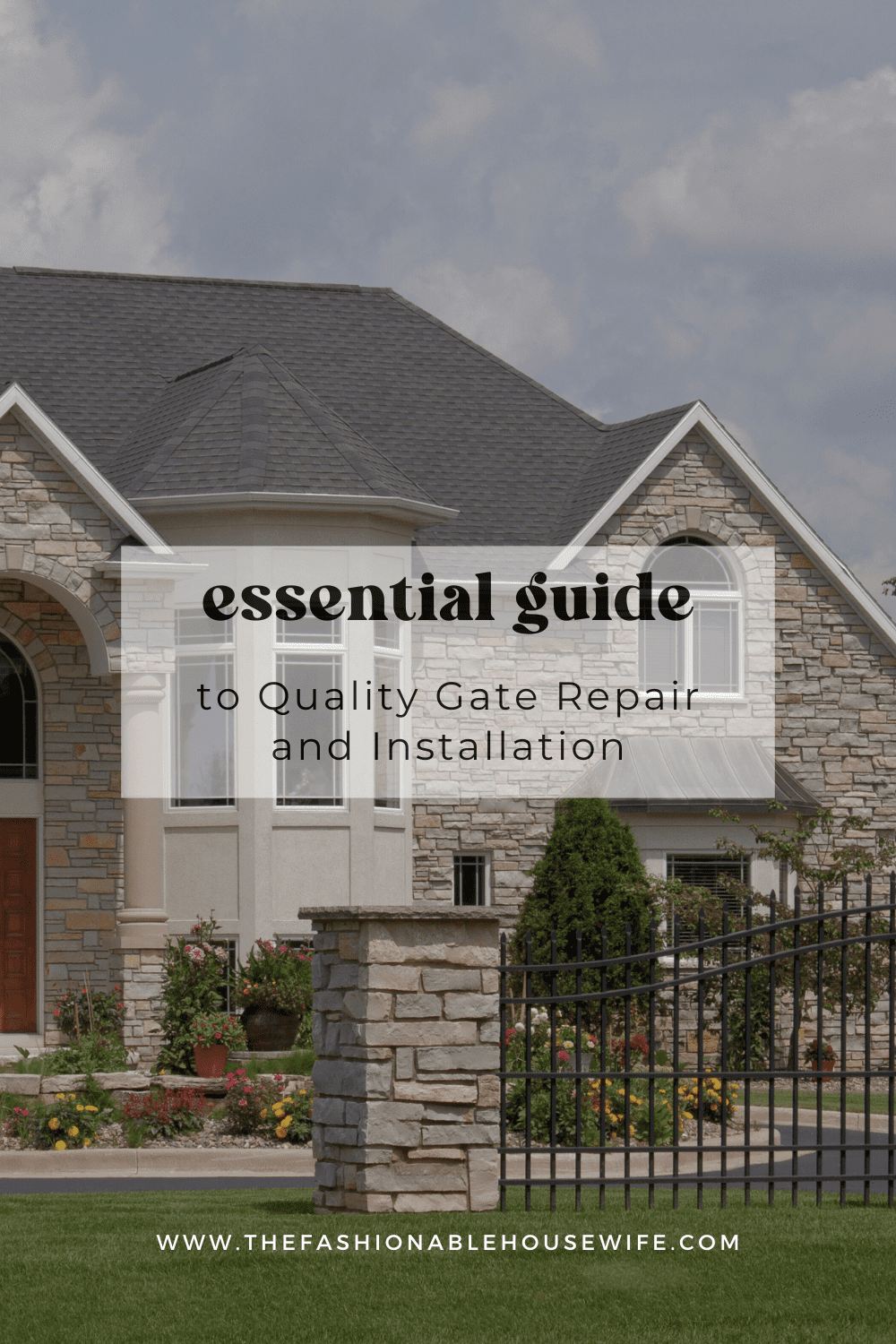Essential Guide to Quality Gate Repair and Installation

Key Takeaways
- Routine maintenance extends your gate’s operational life, efficiency, and reliability.
- Professional service optimizes safety features and maximizes system longevity.
- Recognizing standard gate repair issues enables prompt, cost-effective repairs and minimizes downtime.
Table of Contents
- Importance of Regular Maintenance
- Common Gate Issues and Solutions
- Choosing the Right Gate for Your Property
- Professional Installation vs. DIY
- Enhancing Security with Advanced Features
- Cost Considerations and Budgeting
- Legal and Regulatory Compliance
- Conclusion
Maintaining and repairing your property’s gate is critical for home security, overall appearance, and long-term property value. A well-maintained gate is often the first line of defense for homes and businesses, serving as a barrier and a statement piece for your property. Whether your property is equipped with a traditional manual gate or a sophisticated automated system, consistent and proactive care ensures your gate remains in top working order. Regular attention not only addresses visible wear and tear but also prevents unexpected malfunctions or failures that could compromise safety. Professional electric gate servicing partnerships mean that everything from seasonal tune-ups to urgent repairs is swiftly managed, making it far more convenient to keep your entrance secure, operational, and responsive to your daily needs.
Relying on experts for gate inspection, gate repair, and maintenance offers significant advantages beyond saving time. Routine evaluations by seasoned professionals help spot developing problems early and reduce the risk of expensive emergency repairs. Expert technicians possess the skills to tune sensitive electronic systems, recalibrate motorized parts, and inspect for structural weaknesses, all while ensuring your installation meets current safety standards. This guide provides comprehensive, actionable insight for property owners eager to maximize the benefits of quality gate installation and dedicated ongoing care. By following these best practices, you’ll achieve both durability and peace of mind, enjoying seamless access control and greater property value.
Importance of Regular Maintenance
Regular maintenance is the cornerstone of a dependable, high-performing gate system. All moving mechanisms—hinges, rollers, tracks, and motors—are susceptible to wear, dust accumulation, and weather-induced corrosion over time. Without routine inspection and care, minor issues such as misaligned hinges or sticky rollers can quickly escalate into larger, more expensive repairs or security vulnerabilities. Establishing a clear maintenance schedule, including both visual inspections and lubrication, ensures that potential problems are identified early on. This is particularly vital for automatic gates, where electronics, safety sensors, and remote controls must all be synchronized and calibrated. Skilled technicians can identify subtle warning signs that property owners might miss, providing cleaning, adjustment, and replacement services that significantly delay the need for significant repairs. Regular professional upkeep improves performance and helps safeguard property access, extend equipment life, and ensure that warranties stay valid.
Common Gate Issues and Solutions
Gates encountered several recurring challenges over the years of use. One of the most common issues is misalignment, which results in the gate dragging or failing to latch correctly, often due to shifting ground or worn hinges. Rust and corrosion, particularly in humid or coastal environments, threaten metal gates and component hardware by weakening their structural integrity. Automated gates face problems like electrical faults caused by worn wires, blown fuses, failing motors, and malfunctioning sensors, which can render your gate inoperable or unsafe. Physical blockages from leaves, dirt, gravel, or overgrown landscaping can obstruct tracks and sensors, leading to jamming or inaccurate performance. Many of these problems stem from a lack of regular attention or incorrect installation in the first place. Owners can combat these issues by lubricating moving parts, cleaning debris from tracks and sensors, inspecting weather seals, and arranging prompt replacement of damaged components. When a system fails or behaves inconsistently, professional servicing offers a faster, more accurate diagnosis and repair, restoring full operational function and protecting your investment.
Choosing the Right Gate for Your Property
Selecting an appropriate gate system begins with analyzing your property’s needs, layout, and aesthetic preferences. Gate type plays a pivotal role: swing gates provide a stately, traditional entrance and suit wider properties with ample room for the gate to arc open, while sliding gates are ideal for locations where space is constrained or driveways are narrow. Beyond the basic mechanism, the material you select—steel, wrought iron, treated wood, or aluminum—affects the appearance and future maintenance needs, durability, and compatibility with automation. Some property owners prefer reinforced steel or iron options paired with high-tech locking systems for heightened security. Aesthetics also matter; gates can be customized to match or accent a home’s architectural style, creating curb appeal and increasing property value. Integrating technology, such as access keypads, smartphones, or remote control entry, adds another layer of convenience and protection. The right choice balances your security goals, desired look, and day-to-day usability, ensuring your gateway fits seamlessly into your lifestyle.
Professional Installation vs. DIY
Installing a gate as a DIY project can be tempting, particularly for those hoping to save on labor costs. However, gate installation requires precise technical skills and the right tools, especially for automated or security-enhanced models. Mistakes in measuring, aligning, or installing support posts may lead to premature gate failure, uneven operation, or voided equipment warranties. Improper wiring or programming of electronic gates can also introduce safety risks, such as electrical shorts, accidental lockouts, or non-compliance with local safety codes. Licensed professionals have the training and tools to complete the job efficiently and correctly, from pouring concrete footings to configuring access panels. They’ll ensure your gate is anchored correctly, safely powered, and fully integrated with security features, so you avoid future headaches and enjoy a product that stands the test of time.

Enhancing Security with Advanced Features
Modern gate systems offer various advanced security enhancements to deter unauthorized entry and grant greater control over access. Options such as integrated video intercoms allow property owners to see, speak with, and verify visitors before granting entry, significantly increasing security. Keypad entry systems enable access via PIN codes, which can be changed frequently to maintain security without replacing keys. Many owners now favor cloud-connected gate openers and smartphone apps for real-time monitoring, remote operation, and logging visitation. For businesses, features like automated scheduling, temporary codes, or integration with broader smart home or CCTV surveillance add another layer of protection and peace of mind. When choosing a system, seek features that balance robust security needs with practical daily convenience—ensuring your system is easy to manage without sacrificing safety.
Cost Considerations and Budgeting
Careful gate installation and maintenance budgeting help you secure your property without unexpected financial surprises. Quality gates, materials, and installation may entail a higher upfront cost, but these costs are offset by decreased frequency and severity of repairs. Investing in expert craftsmanship and reputable brands can result in fewer service calls, reduced downtime, and a smoother long-term experience. Maintenance—planned, routine checkups and minor repairs—should be viewed as a small recurring expense that protects your larger investment. Inferior products or neglecting maintenance often lead to expensive emergencies, such as failed motors or compromised locks. Factor in the value of manufacturer warranties, optional service agreements, and the long-term savings of quality construction. Smart budgeting ensures you don’t sacrifice essential features or compromise the reliability of your security system.
Legal and Regulatory Compliance
Compliance with local regulations is essential when installing, upgrading, or replacing a gate. Some municipalities require construction permits prior to work, with particular emphasis on safety for automated or motorized gates. Failing to meet these requirements can lead to fines, forced removals, or costly retrofitting. Regulations may mandate safety devices such as sensors that detect obstacles, prevent entrapment injuries, and placement requirements for gates near sidewalks, roadways, or within homeowner association guidelines. It’s your responsibility as a property owner to ensure your project meets current codes for both safety and accessibility. Checking with your local planning office or using authoritative resources like HouseLogic by the National Association of REALTORS® can clarify requirements before work begins, helping you avoid legal hassles and achieve worry-free security improvements.

Be Proactive About Gate Repair
Proactive care, expert installation, and well-informed choices are key to a resilient and secure gate system. By investing in regular upkeep, utilizing the latest technological enhancements, and adhering to local laws, you’ll reap the benefits of increased property value and peace of mind. Whether planning a new installation, addressing urgent repairs, or scheduling routine electric gate servicing, trusting experienced professionals is the surest route to a security solution that protects your property for many years.

